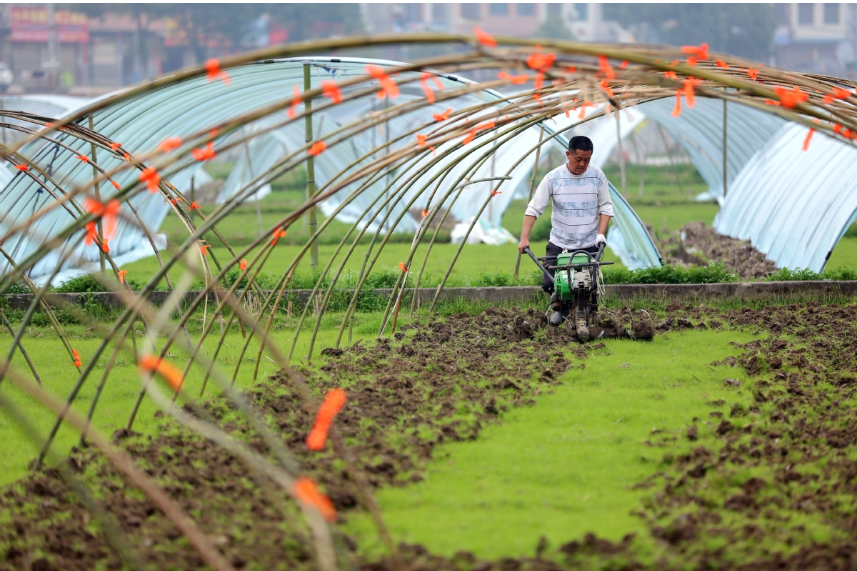
From the People's Daily App.
This is Story in the Story.
As spring planting is in full swing, agricultural companies are sharing their experiences and expertise with farmers to help them use technologies to improve yield and productivity.
Yang Yuanzhu is an agricultural expert and vice-president of Yuan Longping High-tech Agriculture. He is also a popular social media broadcaster who attracts over 100,000 people to his livestreams.
Yang, who is in his late 50s, sat in front of a phone next to a lamp and started livestreaming to his followers in his thick local accent.
Yang is an expert in planting, and each year he goes into the fields to teach farmers new skills. However, this year, due to the novel coronavirus outbreak, he has moved the lessons online.
Today’s Story in the Story looks at how new farming techniques in China are being seen as the way forward.

A farmer plows the land to prepare for spring planting in Shaoyang, Hunan province. (Photo: China Daily)
Zhou Dongdong, a manager with Chinese machinery maker Zoomlion, goes into the fields to demonstrate to farmers how the company's seed thrower works. One training session that was planned to run for 40 minutes lasted over two hours.
"Learning to use, repair and maintain the machines have become new skill requirements for professional farmers today," Zhou said. "As companies, we need to conduct good training and win more customers."
Zhou's company plans to sell 1,500 seed throwers this year. At one training session, he sold 30 of the machines. The company asks salespeople to conduct training for farmers each year. Each dealer trains over 200 farmers.
"We also invite teachers from education institutions to the training, and the content is not just limited to our own products," Zhou said. The training has also helped farmers get jobs with agricultural companies.
Jian Lirong, who runs an agricultural machinery company in Yiyang, Hunan province, said they hired some of the farmers who performed well in training.
"We now have over 20 trainers in the company, and over half of them are former farmers who participated in our training," Jian said.
"They help promote standardized farming ideas and techniques in local villages."
Jiang Taijun, an officer with the provincial Department of Agriculture and Rural Affairs, said when the training focused on hands-on use of the machinery and the production process, it helped the companies improve their products.
"It also serves as a good supplement to government training," Jiang added.
At the same time, a relatively new farming technique known as intercropping has emerged as a viable alternative to help rubber farmers on Hainan island overcome economic uncertainties.
Facing the consequences of crashing natural rubber prices by more than 50 percent, farmers have also been reeling under the catastrophic impact of growing a single crop for years, called mono-cropping.
"The large-scale plantation of a single crop led to a decrease in soil water retention capacity by 17.8 percent, thus increasing flood incidents and also depleting groundwater quality,” said Hua Zheng, a lead project researcher from the Chinese Academy of Sciences (CAS).
In the last two decades, from 1998 to 2017, there was a 72.2 percent increase in the rubber plantation area in Hainan, clearing around 400 square km of the forested regions.
Declining crop productivity and tourism were proving to be double trouble for the islanders so the government, local communities and a team of researchers geared up to tackle the issue.
They initiated the "Ecological Development Strategy" to experiment with intercropping, a technique that involves cultivating valuable plants under the rubber trees.
The concept of intercropping, implemented in Hainan, can also be replicated elsewhere in the world, say researchers.
But the selection of plants would differ depending on the local weather conditions. It can be tea, coffee or any other crop.
According to Gretchen Daily, a faculty director of the Stanford Natural Capital Project, the Hainan agricultural experiment is a win-win-win deal with a triple benefit for farmers and countries facing the consequences of monocropping.
“It helps in ensuring stable income from crops, controls natural disasters like floods, and assures economic benefit to the entire community," she added.
(Produced by Nancy Yan Xu, Brian Lowe, Lance Crayon, and Da Hang. Music by bensound.com. Text from CGTN and China Daily.)


